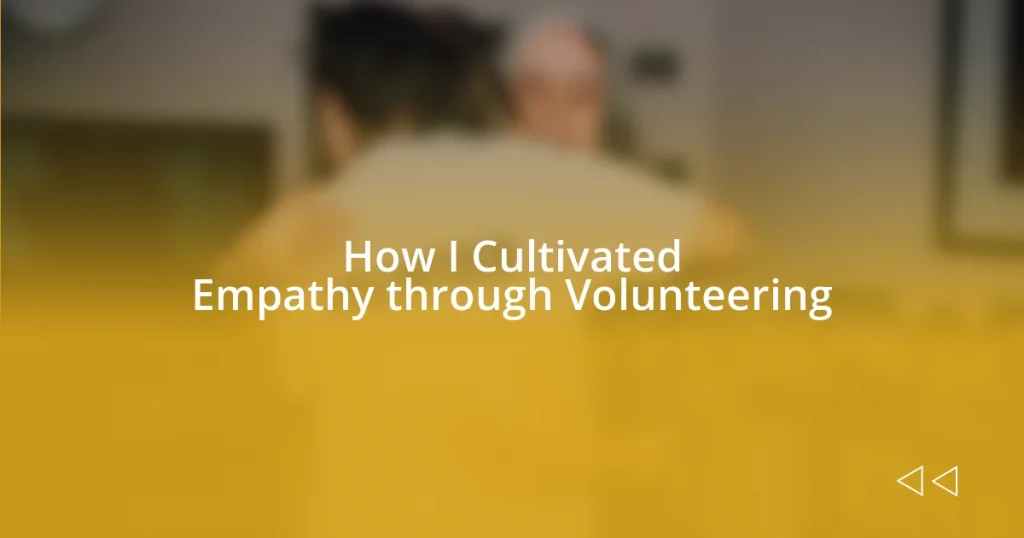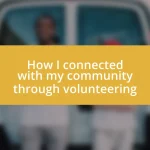Key takeaways:
- Volunteering fosters empathy through direct connections with others, allowing for a deeper understanding of their experiences and challenges.
- Choosing the right volunteering opportunity aligned with personal passions enhances the impact and overall experience of giving back.
- Integrating empathy into daily interactions through small acts of kindness and active listening can enrich personal relationships and community connections.
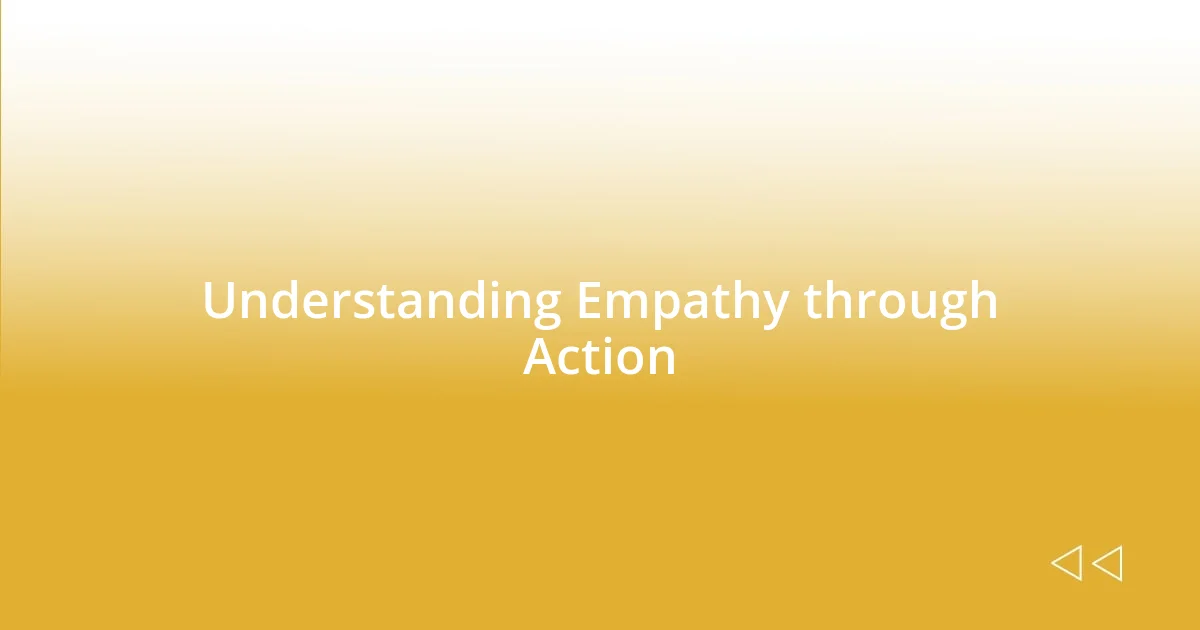
Understanding Empathy through Action
When I first stepped into a local soup kitchen as a volunteer, I felt a mix of excitement and nervousness. The moment I served a warm meal to someone in need, something shifted within me. That simple act not only provided nourishment but also created a connection that transcended our circumstances. Have you ever experienced that feeling of shared humanity when reaching out to others? It’s incredibly powerful.
I remember an interaction with an elderly gentleman who shared his life story while I helped him with his meal. Listening to his voice, filled with both struggle and resilience, made me realize how easily we can overlook the depth of others’ experiences. This exchange taught me that empathy isn’t just about feeling for someone; it’s about understanding their journey. Have you ever stopped to reflect on the stories behind the faces you encounter each day?
Through volunteering, I began to see empathy as an action rather than a mere sentiment. It’s about stepping into someone else’s shoes and holding space for their feelings and experiences. I found that even small gestures, like a smile or a kind word, can spark profound connections. Could it be that our everyday interactions hold the potential for empathy if we only take the time to notice?
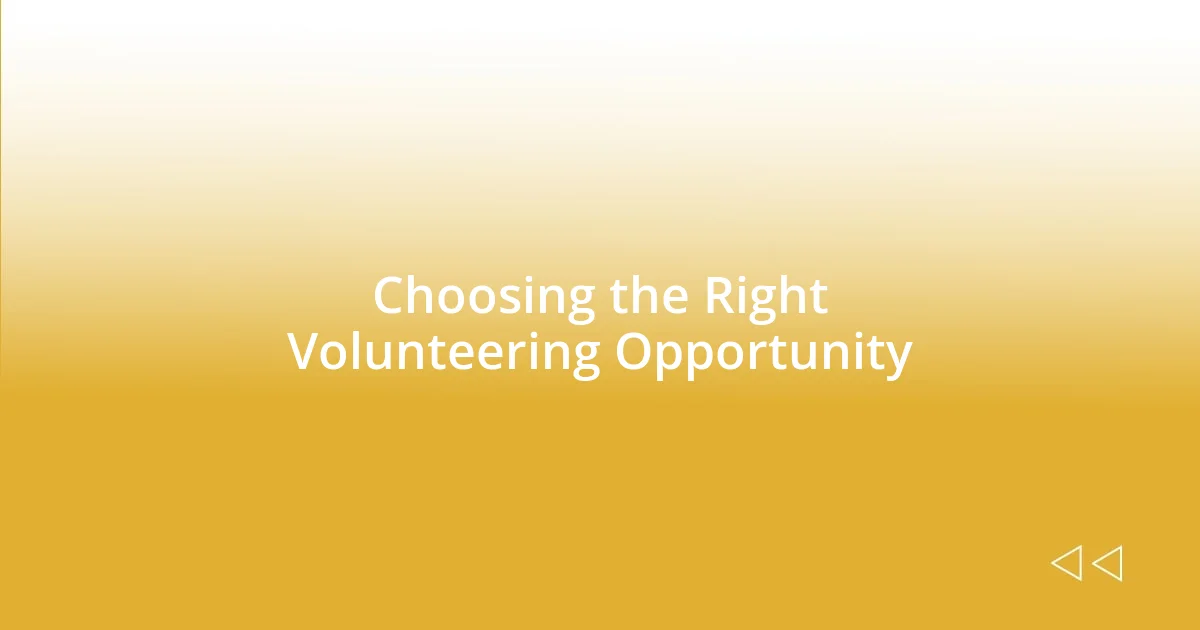
Choosing the Right Volunteering Opportunity
Choosing the right volunteering opportunity can be a game-changer in your quest to cultivate empathy. I recall the time I opted to volunteer at a local animal shelter instead of a conventional soup kitchen. Initially drawn to the idea of helping people, I found unexpected lessons in compassion by caring for vulnerable animals. Each wagging tail and timid purr opened my eyes to the simple joys and sorrows that exist in the world, reminding me that empathy can extend beyond human interactions.
Here are a few tips to consider when selecting your volunteering path:
- Identify Your Passion: Reflect on what issues resonate with you. Is it homelessness, education, or environmental conservation?
- Consider Your Skills: Think about your talents and how they can be applied. Anecdotally, I discovered my knack for teaching during my time at a literacy program, helping adults gain confidence in their reading skills.
- Evaluate Your Commitment: Be honest about the time you can dedicate. I once overcommitted to multiple projects, which ultimately diluted my impact and enjoyment.
- Research Organizations: Investigate various causes and organizations. Make sure their values align with yours; this connection will enhance your experience.
- Start Small: If you’re unsure, dip your toe in with a one-time event. My first day at the shelter was a short shift, which turned into a weekly commitment once I saw the difference I could make.
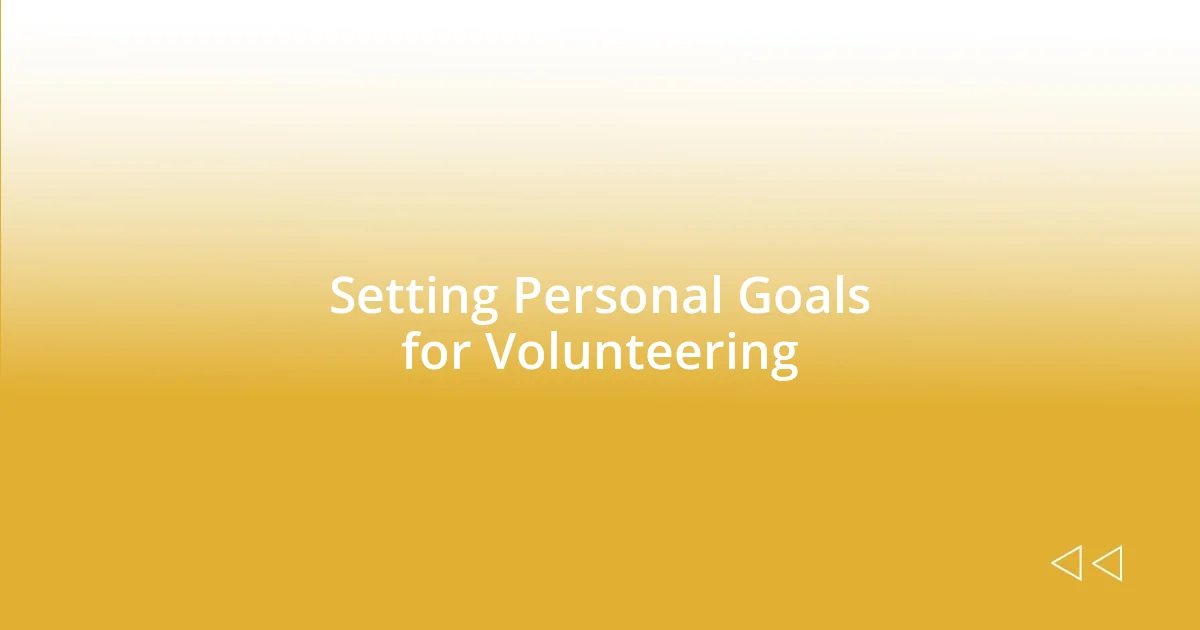
Setting Personal Goals for Volunteering
Setting personal goals for volunteering can significantly enhance your experience and the impact you make. I remember setting a goal during my first volunteering stint to not just give aid but also to learn from those I was helping. This shift in perspective allowed me to enter each interaction with curiosity rather than just sympathy. The more open I was to learning from others, the deeper my connection grew. Have you thought about what you want to achieve through your volunteering?
Creating specific, measurable goals can guide your volunteering journey. For instance, I aimed to volunteer at least once a week for six months. This commitment not only strengthened my relationship with the community I served but also deepened my understanding of their challenges. Keeping track of my experiences in a journal helped me reflect on my growth and the evolving nature of empathy in my life. Have you considered how maintaining a record of your experiences might impact your understanding of empathy?
When setting your goals, it’s invaluable to keep your personal values front and center. I realized my desire to foster education and literacy was deeply rooted in my own upbringing. Understanding this about myself fueled my passion as I volunteered to support youth literacy programs. This alignment between my goals and personal values ensured that I was not only engaged but truly passionate about the work I was doing. What passions drive your desire to volunteer, and how can you integrate those into specific goals?
| Goals | Examples |
|---|---|
| Learn from Others | Engage in active listening during interactions |
| Commitment | Volunteer once a week for six months |
| Reflect on Experiences | Keep a journal of your volunteering insights |
| Align with Values | Volunteer for causes that resonate personally |
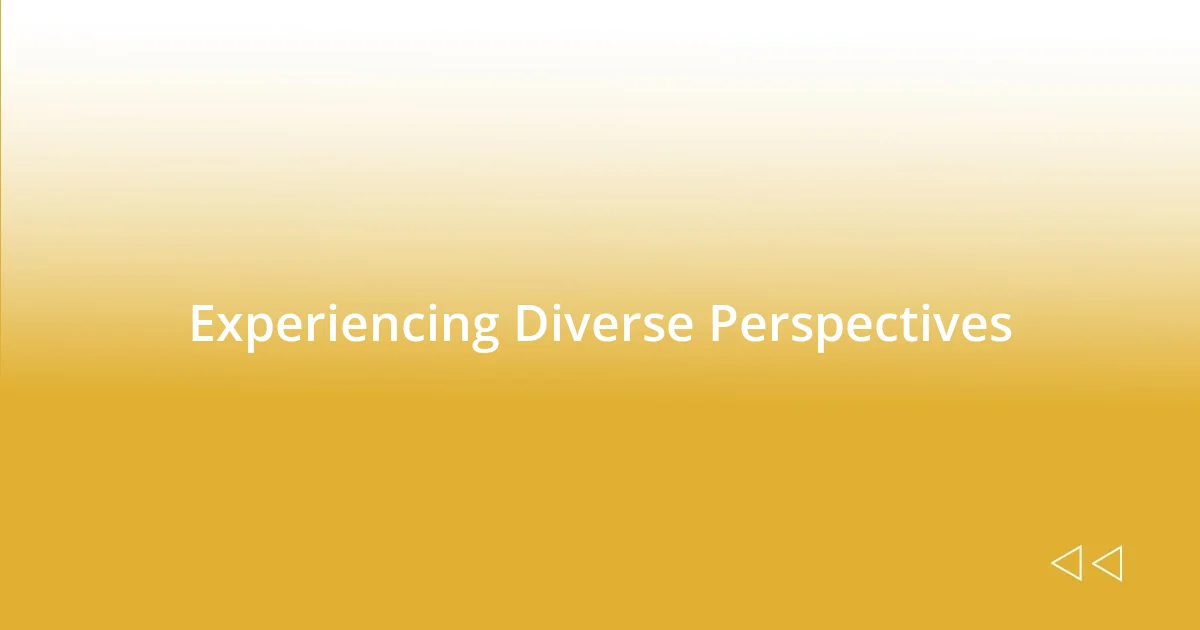
Experiencing Diverse Perspectives
Experiencing diverse perspectives through volunteering opened my eyes to the narratives that shape lives very different from my own. During a community outreach program, I met a single mother struggling to provide for her children. Listening to her story, I felt a profound shift in my understanding of resilience and hardship. It made me question my assumptions and realize that everyone’s journey is filled with unique challenges.
Connecting with individuals from various backgrounds taught me the importance of humility. One memorable instance was sharing a meal with seniors at a local retirement home. Their tales of love, loss, and happiness sparked an emotional connection I hadn’t anticipated. I left that day not just with stories but with a deeper appreciation for the richness of life experiences that each person brings to the table. How often do we ignore these narratives, assuming someone else’s life is just like our own?
Every new perspective I encountered felt like a layer peeling away from my own understanding of the world. I recall volunteering at a youth mentoring program where one young girl opened up about her dreams of becoming an artist despite facing systemic barriers. Her passion ignited a flame within me; it made me reflect on the privileges I often took for granted. It’s in these moments of vulnerability that I found common ground and a renewed commitment to advocate for equity. Have you ever felt that spark of inspiration when someone shares their truth with you? Those interactions are what truly cultivate empathy.
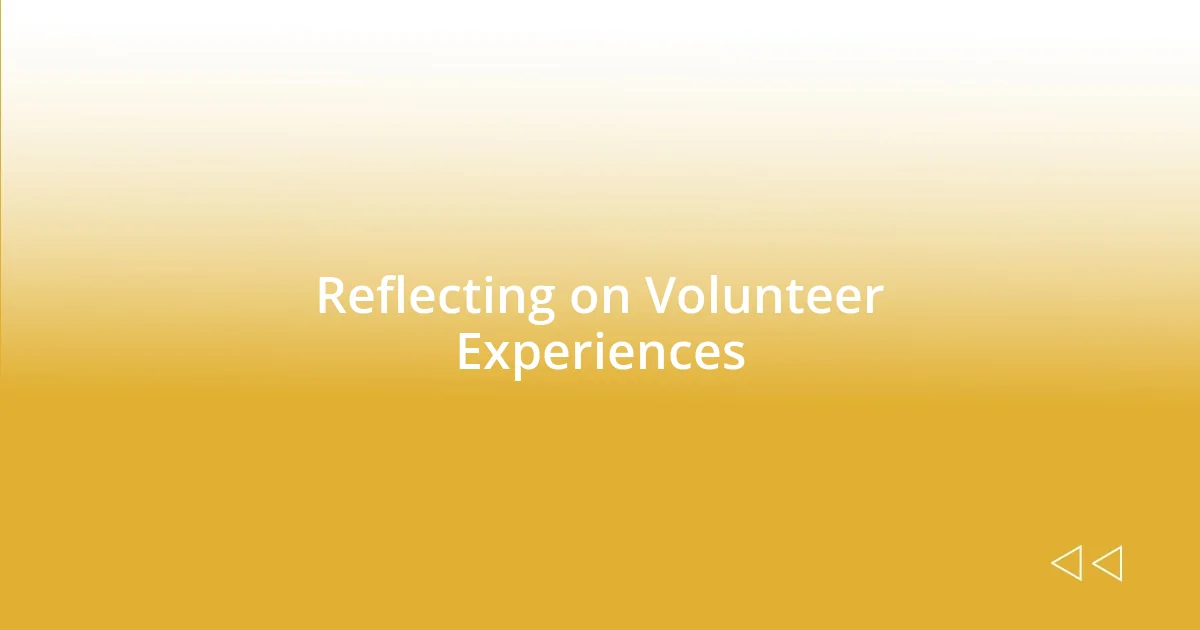
Reflecting on Volunteer Experiences
Reflecting on my volunteer experiences often brings up vivid memories that shaped my understanding of empathy. I recall a day spent at a food bank where I was sorting donations. I struck up a conversation with a woman who came in to collect food for her family. Her gratitude and warmth turned an ordinary day into a powerful lesson in resilience. Have you ever felt your perspective shift when you connected with someone whose life experiences are so different from yours?
When I think back on the times I volunteered, journaling my reflections was a game-changer. Each week, I would jot down not just what I did, but how I felt during those moments. Re-reading those entries, I noticed how my feelings of helplessness transformed into hope and understanding. Isn’t it fascinating how documenting our thoughts can help us dissect our emotional evolution?
Some experiences linger with me long after volunteering ends. I once helped organize a community art project, and the joy on the children’s faces as they painted was infectious. That simple act of creating together breached barriers and sparked conversations about dreams and aspirations. What I learned is that building bridges through shared experiences can ignite empathy in ways reading about others’ lives never could. Don’t you think there’s something magical about interacting directly with people that opens our hearts?
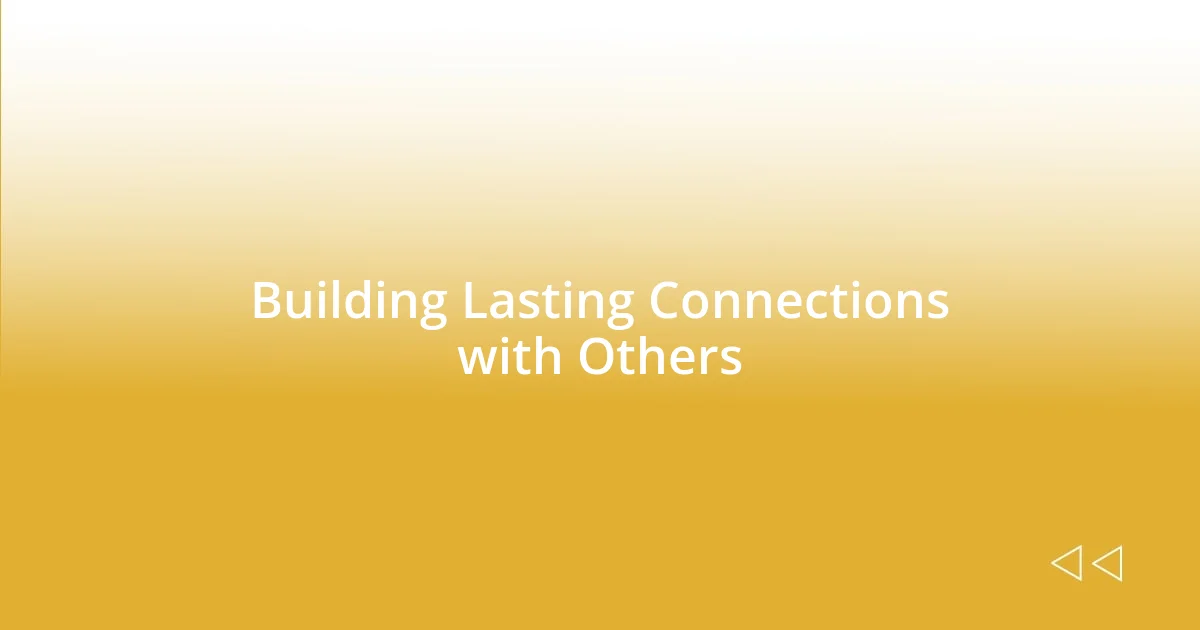
Building Lasting Connections with Others
Building lasting connections with others is at the heart of my volunteering journey. One instance that stands out was during a weekend spent mentoring kids at a local community center. As we worked on a group project, I noticed how their laughter and enthusiasm lit up the room. It reminded me that genuine connections are often forged in shared activities, where we can be vulnerable and open. Have you ever experienced that rush of camaraderie when working towards a common goal?
Another memorable moment was participating in a neighborhood cleanup initiative alongside families from all walks of life. I bonded with a woman who had just moved to the area, sharing our thoughts about community improvement. It was surprising how quickly we transitioned from small talk to discussing our hopes for a better environment for our children. In that moment, I felt an undeniable sense of unity that transcended our differences. Isn’t it fascinating how shared purposes can bring people closer together?
The relationships I formed during these volunteering experiences have often turned into meaningful friendships. I still keep in touch with several volunteers from that cleanup day. Recently, we reunited for a coffee and shared our personal growth stories since. Those connections, nurtured through active participation, evolve into lasting support systems. Have you thought about how engaging with others through volunteering can enrich your life in unexpected ways?
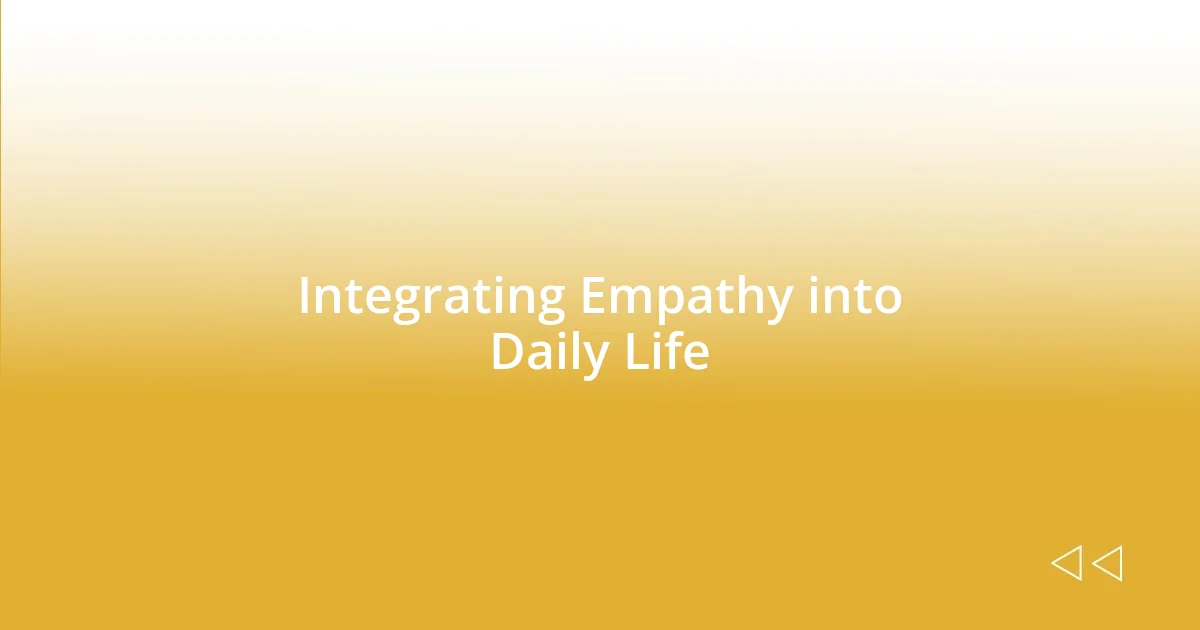
Integrating Empathy into Daily Life
Integrating empathy into daily life can be as simple as changing the way we interact with those around us. I remember a morning when I decided to ask my barista about her day, rather than keeping it brief. Her honest response—to a stranger, no less—revealed her challenges and dreams, making me realize how a few minutes of genuine conversation can create connections that brighten our day. Have you ever paused to truly listen to someone’s story? Those moments can remind us how intertwined our human experiences really are.
Sometimes, I find that empathy blooms through ordinary, everyday actions. One Saturday, while grocery shopping, I noticed an elderly gentleman struggling with his bags. I felt a tug in my heart and offered my help. When he smiled gratefully and shared a snippet of his life, it sparked a realization: small acts of kindness don’t just impact others; they also enrich our own lives tremendously. Isn’t it remarkable how a simple gesture can foster understanding and shared humanity?
Incorporating empathy also means being mindful of our surroundings. Since volunteering, I’ve made a conscious effort to observe the people around me—whether on the bus or at a park. A while ago, I saw a mother juggling a fussy child and groceries. Instead of looking away, I smiled and offered assistance, which turned into a chat about parenting challenges. Each interaction teaches me to appreciate diverse perspectives and reinforces the importance of compassion, reminding me that we’re all navigating our unique journeys. How often do we practice this kind of mindfulness in our daily routines?










